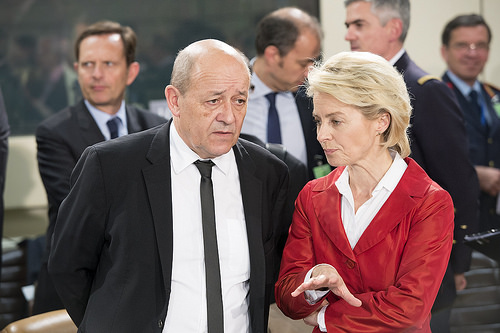 Insights from the 13th annual “summer defense college,” in Strasbourg.
Insights from the 13th annual “summer defense college,” in Strasbourg.
Efforts to showcase examples of progress in European defense—especially in the areas of defense industrial cooperation and European Union-led operations—and exhortations to fellow Europeans to go farther and faster have been a staple of the summer defense college, and Strasbourg was no exception. In plenary speeches and not-for-attribution sessions, various speakers credited French persuasiveness with having implanted the notion of common security interests into the “European spirit.” Others opined that new advances were just over the horizon—if only EU leaders could muster the “political will.”
But this year, such invocations seemed to fall on increasingly skeptical ears.
In truth, even fervent advocates of European defense had already voiced their dismay. “Let’s be frank: the (EU’s) Common Security and Defense Policy is not working,” Arnaud Danjean, a French member of the European Parliament and security affairs expert told French parliamentarians during a July roundtable. “The majority of European states don’t view it as useful and don’t want to play the game.” For Danjean, the convergence of two factors explains this: the impact of the financial and budgetary crises, particularly among southern European countries; and the Ukrainian crisis, “which completely torpedoes the European defense idea, since the states of northeast Europe turn reflexively to NATO—in other words, to the American ally.” At the same meeting, Vice Admiral Charles-Edouard de Coriolis, the French military representative who is dual-hatted to the EU and NATO, put a more positive spin on the added-value of the EU’s six ongoing military operations and training missions. But de Coriolis also candidly acknowledged systemic EU problems ranging from “nightmarish” force generation to inadequate common funding. Moreover, as he pointedly observed: “French forces carry the lion’s share of the anti-terrorist fight in the Sahel. This gives us autonomy and flexibility, but our western partners take advantage of this to treat security issues in the south as a French problem.”
At Strasbourg, prominent non-government experts privately echoed those concerns, calling attention to the June 2015 European Council discussions on defense. Those discussions (at head of state and government level) had been framed as an action-oriented follow-up to the Council’s December 2013 meeting that announced ambitious steps to strengthen Europe’s military capabilities and defense industries. The June meeting, however, produced little beyond agreement that the High Representative should prepare a new EU foreign and security policy strategy for submission to the Council by next June.
Other impediments to European defense surfaced, as well. One session, which apparently was intended to advertise bilateral cooperation between France and Germany as the “engine” of European defense, did more to expose their differences than commonalities. As French participants pointed out, the decades-old French-German brigade has yet to deploy in a demanding operation, and the two militaries place very different priorities on “autonomous” intelligence and “first entry” capabilities. A former senior French official’s question on whether the two countries share the same vision of NATO and the EU went unanswered. A German military representative listed his country’s several overseas military missions, but acknowledged that the total of deployed German forces has dropped from 7000 to 2000 since 2009. Adding to the air of discord, a French participant suggested that European defense had been hamstrung by UK opposition, prompting a British attendee to remind the audience that a potent Franco-British Combined Joint Expeditionary Force, launched by the 2010 “Lancaster House” treaty, will become operational in 2016.
Leo Michel a Non-Resident Senior Fellow at the Atlantic Council’s Brent Scowcroft Center on International Security. This is the second piece of a three part series.
Image: French Defense Minister Yves Le Drian and German Defense Minister Ursula von der Leyen, June 3, 2014 (photo: NATO)
